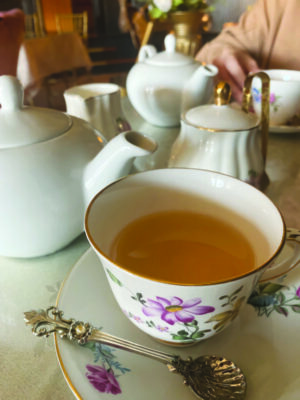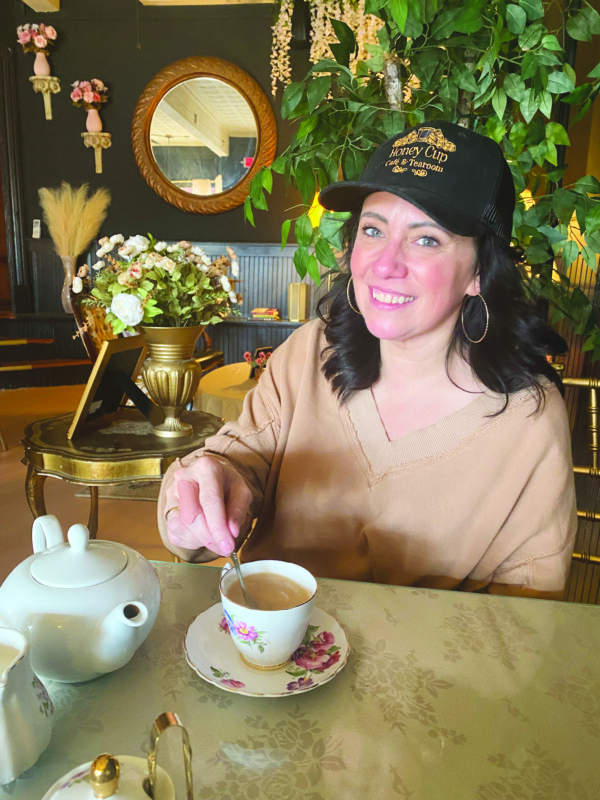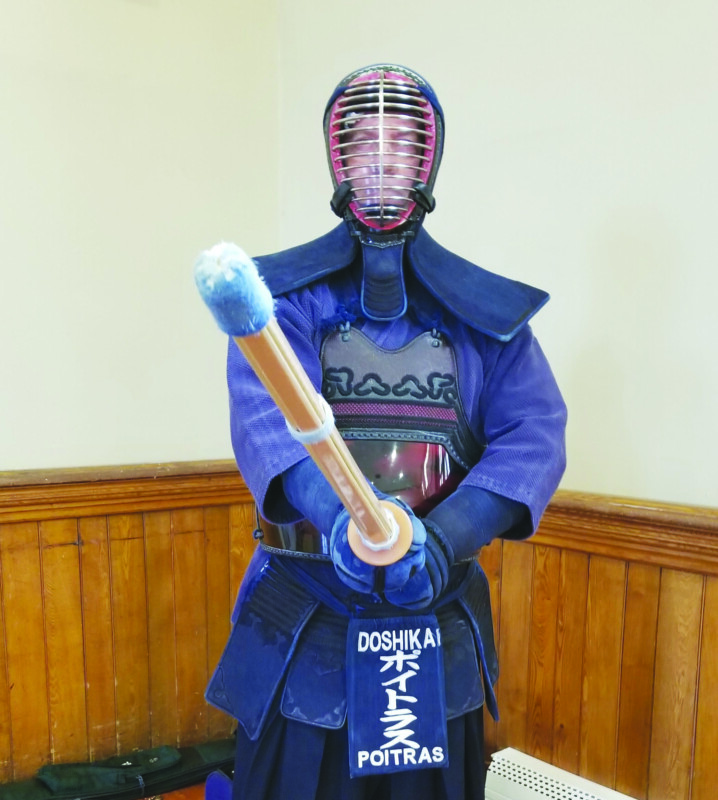Honey Cup Cafe & Tearoom offers tea and a moment of calm
By John Fladd
If you ask Mara Witt, the owner of Honey Cup Cafe & Tearoom, what Manchester needs, she’ll tell you it’s a tea room. The tea is important, of course, but Witt said that a tea room fills a need many adults have: It’s a space to relax and spend time with other adults; to inject a little civility into their day-to-day routine.
“I think a lot of other women need something to be able to look forward to,” she said. “It just kind of elevates your daily life a little bit to be able to sit down and feel a little bit fancy with little sandwiches and enjoy a warm drink with someone. It’s nice to have something that’s not so alcohol-focused. There’s a lot to do that is alcohol-focused. It’s nice to have a way to go out with someone that you can do in the morning and not feel guilty about it that’s not coffee- or alcohol-focused.”
Since its formal opening in December, the Honey Cup has had a mixed clientele.
“I have definitely been pleasantly surprised with the amount of men,” Witt said. “It turns out that a lot of men really enjoy drinking tea. But they also like the tea room; they like the aesthetic. They find it a nice relaxing place to be.”
Although the Honey Cup serves coffee and even a few low-octane cocktails, the focus is on tea and tea-adjacent foods.
“We have a focus on vintage comfort foods,” Witt said. “The idea is a bit like a vintage lunch counter.” To that end, there are breakfast items, baked goods like scones, and finger sandwiches. “And then we do a formal tea on Saturdays and Sundays at two o’clock by reservation,” Witt added, “which is a full afternoon tea service.”
The Full Afternoon Tea is an example of curating a grown-up experience for Witt’s customers. “It’s modeled after a Victorian English version of afternoon tea,” Wit said. “We serve three tiers. The bottom tier is always finger sandwiches; we do chicken salad, deviled egg, [and] cucumber sandwiches of course, and then salmon — a lox sandwich. The second tier is always scones, so we usually have two kinds of scones to choose from. We serve that with authentic clotted cream, lemon curd, and jam to put on the scones. And then on the top we always have a [pastry] assortment — things like petit fours or macarons. Each person has a personal pot of tea and it’s a bottomless pot so they can try all the teas on our menu.”

A big part of creating a comfortable space has been building an aesthetic, Witt said.
“I guess I’m what you might describe as a maximalist. I think I identified with that. [Our look] is very vintage, floral, and a little feminine. I wanted it to feel kind of like a parlor, like you’re going to the parlor in someone’s house and enjoying tea time there, like they did in the olden days.” To that end, the wallpaper in both rooms in the cafe has a bold floral design. There are comfortable chairs to sit in, and even a sofa. Witt pointed to a floral spray in one corner of the tea parlor. “In my loan paperwork, I said I need $5,000 for a floral installation,” she said. “And my loan officer said, ‘Absolutely not.’ So I did them myself for not $5,000 and so far everyone likes my floral arrangement.”
While walk-in customers make up a sizable portion of the Honey Cup’s business, Witt’s strategy is to lean into events.
“We can host private events after four,” she said. We’re closed at three, so we can do private room rentals for sure. And we have the catering as well. I think we’ll do well with the room rentals once the word is out about that.”
The space is perfect, she said, for small gatherings like book clubs and showers.
“We’re doing a ‘Blind Book Club’,” she said, “where I wrap all the books and nobody knows what book it is before they buy it. The first time we did it, it sold out in one week and we sold all the books. Readers love it; it’s like a blind date. We set a date, then meet to have a little tea and discuss the book. And the response is just like people love it, like blind date with a book … and then we’re going to meet here on Jan. 25 and have a little tea and discuss the book. I really wanted to have a community place for knitting clubs or book clubs or things like that or a place to just come in the morning and just sit and relax.”
Honey Cup Cafe & Tearoom
150 Bridge St., Manchester, 836-6008, honeycupnh.com
Open 7 a.m. to 3 p.m. seven days a week. Catering and room rentals are available. Special events are listed on the Honey Cup website.
Featured photo: Mara Witt, owner of Honey Cup Cafe and Tearoom. Photo by John Fladd.






